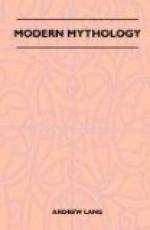My other citation of Professor Tiele in 1887 says that our pretensions ‘are not unacknowledged’ by him, and, after a long quotation of approving passages, I add ’the method is thus applauded by a most competent authority, and it has been warmly accepted’ (pray note the distinction) by M. Gaidoz. {31c} I trust that what I have said is not unfair. Professor Tiele’s objections, not so much to our method as to our manners, and to my own use of the method in a special case, have been stated, or will be stated later. Probably I should have put them forward in 1887; I now repair my error. My sole wish is to be fair; if Mr. Max Muller has not wholly succeeded in giving the full drift of Professor Tiele’s remarks, I am certain that it is from no lack of candour.
The Story of Cronos
Professor Tiele now devotes fifteen pages to the story of Cronos, and to my essay on that theme. He admits that I was right in regarding the myth as ‘extraordinarily old,’ and that in Greece it must go back to a period when Greeks had not passed the New Zealand level of civilisation. [Now, the New Zealanders were cannibals!] But ’we are the victims of a great illusion if we think that a mere comparison of a Maori and Greek myth explains the myth.’ I only profess to explain the savagery of the myth by the fact (admitted) that it was composed by savages. The Maori story ‘is a myth of the creation of light.’ I, for my part, say, ’It is a myth of the severance of heaven and earth.’ {32a} And so it is! No Being said, in Maori, ‘Fiat lux!’ Light is not here created. Heaven lay flat on Earth, all was dark, somebody kicked Heaven up, the already existing light came in. Here is no creation de la lumiere. I ask Professor Tiele, ’Do you, sir, create light when you open your window-shutters in the morning? No, you let light in!’ The Maori tale is also ‘un mythe primitif de l’aurore,’ a primitive dawn myth. Dawn, again! Here I lose Professor Tiele.




